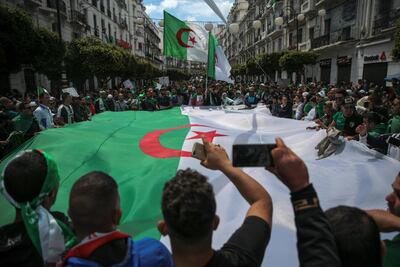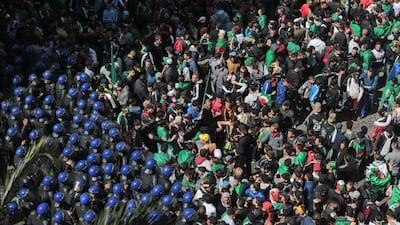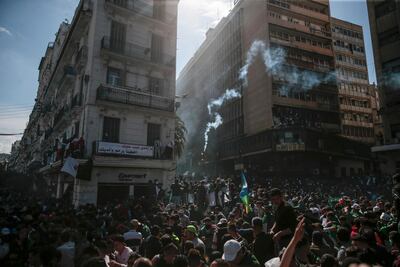Despite the fact that President Abdelaziz Bouteflika resigned nearly two weeks ago, hundreds of thousands of protesters are still taking to the streets of Algeria demanding a more comprehensive change in the North African nation’s leadership.
On Friday, mass rallies across the capital led to clashes with the police that left more than 200 arrested and over 80 officers injured.
Police in anti-riot gear fired tear gas to disperse a crowd of several hundred youths in the city centre, witnesses said, after an otherwise largely peaceful march joined by families throughout the day.
The police said that 180 people were arrested after clashes sparked by "infiltrators" among the demonstrators who injured 83 policemen.
The 82-year old Mr Bouteflika stepped down after 20 years in power 10 days ago, bowing to pressure from the army and weeks of demonstrations mainly by young people seeking change in the country.
But the protests, which began on February 22 and have been largely peaceful, have continued as many want the removal of an elite that has governed Algeria since independence from France in 1962 and the prosecution of people they see as corrupt.
Mr Bouteflika has been replaced by Abdelkader Bensalah, head of the upper house of parliament, as interim president for 90 days until a presidential election on July 4.
"No to Bensalah," the protesters chanted on Friday.
"We want the prosecution of all corrupt people" and "no to the gang", said banners held up by the protesters. Many waved Algeria's white, green and red crescent moon flag.
"We came out today to say that Bensalah's position is unconstitutional," one of the protesters, who gave his name as Nawal said.
"We do not deserve military rule. We deserve a democratic and free Algeria," he added.
Ali Badji, a 52-year-old grocer holding his son on his shoulders, said: "We are still sticking to our demands. We want a radical change."

State television said similar protests took places in most cities.
Police in a statement said they had arrested members of an unspecified "terrorist group" and also some foreigners who had planned to incite protesters to violence. The statement gave no details.
More than one in four people under the age of 30 are unemployed – one of the central grievances of protesters who want the economy liberalised and diversified to reduce its reliance on its oil and gas production.
On Wednesday, Algeria's army chief, Lt Gen Ahmed Gaed Salah, said he expected to see members of the ruling elite close to Bouteflika, who he called a "gang", prosecuted for corruption and said he would support a transition toward elections.
The army initially monitored the unrest from the sidelines. Then Lt Gen Salah intervened, declaring Mr Bouteflika – rarely seen in public since suffering a stroke in 2013 – unfit to rule.


